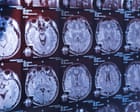Early instruction that teaches young people how to recognise negative thought patterns and manage their mental health may help to avoid problems in later life
I was about 16 when I had my first bout of depression, but 29 when I sought help and received a diagnosis. In the intervening period, I thought I could weather my low moods alone, but the waves of hopelessness didn’t lessen; they only gained momentum. I was left with a strong desire to evaporate, leaving no trace of my existence in the world.
I am extremely lucky to have responded well to a course of cognitive behavioural therapy (CBT), but I can’t help wondering how much pain I could have avoided if I’d learned to manage my mental health better at a younger age, before my symptoms had even started to develop.








More Stories
The extraordinary promise of gene editing – podcast
Volunteer archaeologists unearth winged goddess at Hadrian’s Wall – video
Sea level rise will cause ‘catastrophic inland migration’, scientists warn